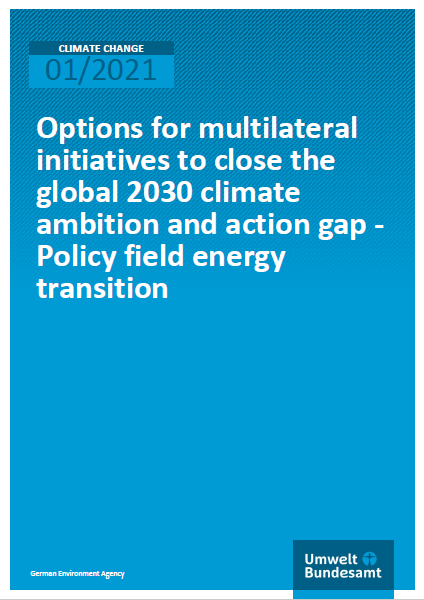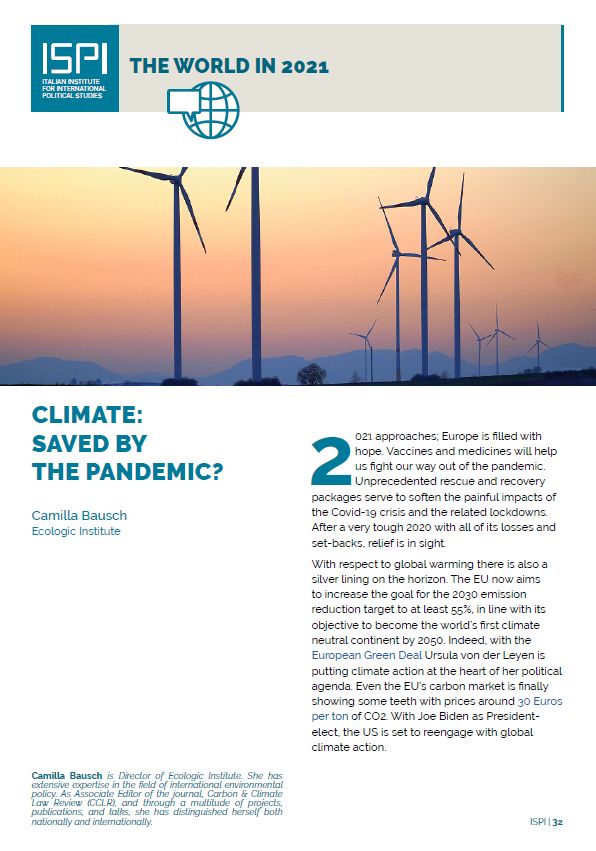-
Dr. Camilla Bausch Discusses the Climate Crisis in Times Marked by the Global Pandemic at the Think20 Italy Inception Conference
- Presentation
- Date
-
- Location
- online, Italy
- Panel discussion
To provide the G20 leaders with scientific advice, Think20 – a group of think tanks and academia from G20 countries – will work over the upcoming months on policy papers and recommendations. At the T20 Inception Conference, thought leaders and policy makers like Paolo Gentiloni (European Commissioner for Economy), Jeffrey Sachs (Director of the Center for Sustainable Development at Columbia University), and Fatih Birol (Executive Director, International Energy Agency – IEA) came together to highlight and discuss pressing issues for 2021. Dr. Camilla Bausch (Ecologic Institute) spoke both on the impacts of the pandemic on pathways towards a climate-friendly future and on multilateral opportunities in 2021.
The Inception Conference was structured along the priority headlines of the Italian G20 presidency: "People, Planet, Prosperity." In her contributions to the Session on "Planet", Dr. Camilla Bausch, Co-chair of the T20 Task Force "Climate Change, Sustainable Energy & Environment", addressed the impacts of the pandemic on emission levels. While acknowledging considerable emissions reductions in 2020, Dr. Bausch cautioned that these were not a reflection of a targeted transformation towards a climate-friendly future nor of sustainable structural change. Furthermore, these emission reductions were the result of massive encroachments to fundamental freedoms, prominently the freedom of movement. Dr. Bausch named three decisive factors that will determine whether the impacts of the pandemic on climate change will be negative or positive in the long term:
- Policy makers must devote adequate attention and time to solving the climate crisis despite the urgent need to act on the health and on the economic crisis. This involves setting the necessary frameworks to accompany the transformation. Moreover, a sustainable transition will require that policy makers take a long-term view and live up to their responsibilities towards future generations.
- The trillions of dollars now spent globally on recovery measures must be invested in a way that supports climate-friendly pathways. Governments will have to invest in technologies and infrastructures that are fit for a climate-friendly future and avoid investments that might harm the climate agenda.
- The lessons learned from the global pandemic must be taken seriously. These include the importance of
a) the resilience in the face of fragile systems, b) scientific advice for policy making, c) the precautionary principle. Lessons also relate to changes in behavioral patterns (for example for business meetings), and new modes of research cooperation.
In reference to the critical 2021 Climate Summit (COP26), Dr. Camilla Bausch emphasized the potential of the G20 to build "political momentum". She pointed out the interesting line-up of presidencies: In 2021, the UK will preside over the G7 summit in summer, Italy over the G20 summit in autumn while UK and Italy hold a joint presidency for the UN climate summit. This offers a unique opportunity to work through the G7 and G20 towards a success at the COP. Moreover, Dr. Camilla Bausch underlined the importance of the climate summit as countries are expected to ratchet up their respective ambition regarding climate change mitigation. This ratchet-up mechanism was introduced to incentivize the global community to get on a pathway compatible with the ambitions of the Paris Agreement.
In order to contribute to solving the climate crisis, Dr. Camilla Bausch called on the G20 to address their carbon heavy economic structures. Her recommendations included
- Making green recovery a key issue of the work in the G20 as this will be paramount to forging climate-friendly pathways for the future. This could be the basis for establishing a Global initiative for a Green Recovery.
- Ratchet up the national ambitions on climate mitigation in time for COP26 (if G20 countries have not done so yet).
- Define concrete action and timelines to phase out fossil fuels subsidies.
The first keynote for Session II were provided by Alicia Bárcena, Executive Secretary of the Economic Commission of Latin America and the Caribbean, who called for a new development paradigm to address inequality and environmental impacts. Her intervention was followed by the keynote of IEA President, Dr. Fatih Birol, who highlighted 2021 as a pivotal year for climate and energy. The final keynote was delivered by Dr. Jeffrey Sachs of Columbia University’s Centre for Sustainable Development. He named three key sectors that must be addressed in order to create pathways to a more sustainable world:
- greening the energy system, including the grid,
- sustainable land use (linking it to the COP on biodiversity in October), and
- recreating sustainable and equitable food systems (linking it to the food systems summit in September).
The ensuing panel debate included Camilla Bausch, Fahad Alturki, Chair of T20 Saudi Arabia T20 and Ernest J. Moniz, CEO of the Nuclear Threat Initiative, who both addressed aspects of circular economy, innovation and digitization in the fight against climate change.
The full agenda of the inception conference can be viewed here.
Think20 (T20) brings together leading think tanks and research institutions from across the globe. The T20 works as an incubator for ideas and aims to make research-based policy recommendations available to the G20 leaders. During the Italian G20 presidency, the Italian Institute for International Political Studies (ISPI) acts as the National T20 Coordinator and Chair, along with the Istituto Affari Internazionali (IAI) (T20 Co-Chair) and the Bocconi University (T20 Summit Co-Chair).
Camilla Bausch's contribution to the T20 Conference and her role as Co-Chair are made possible through the generous support of the Stiftung Mercator.





